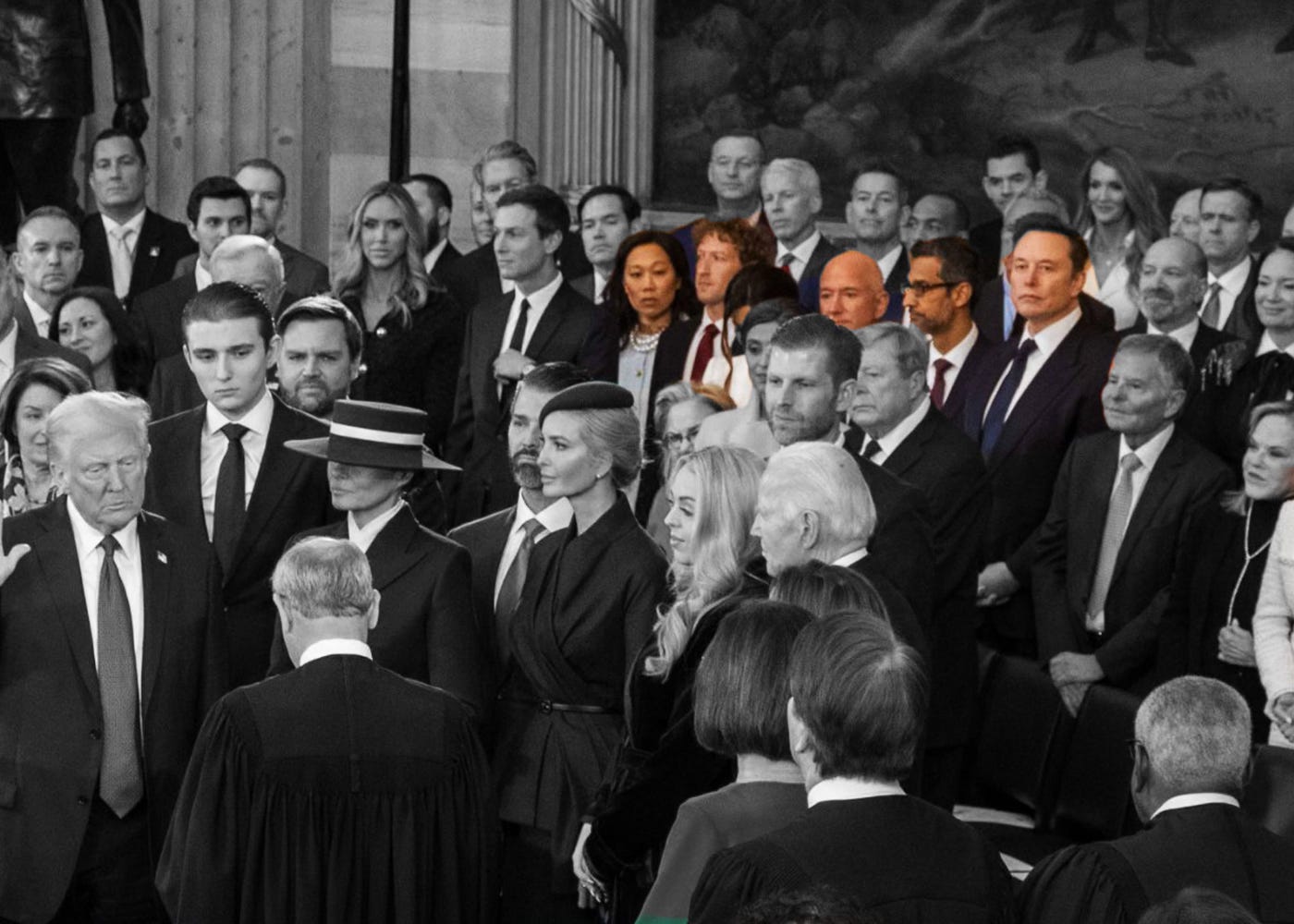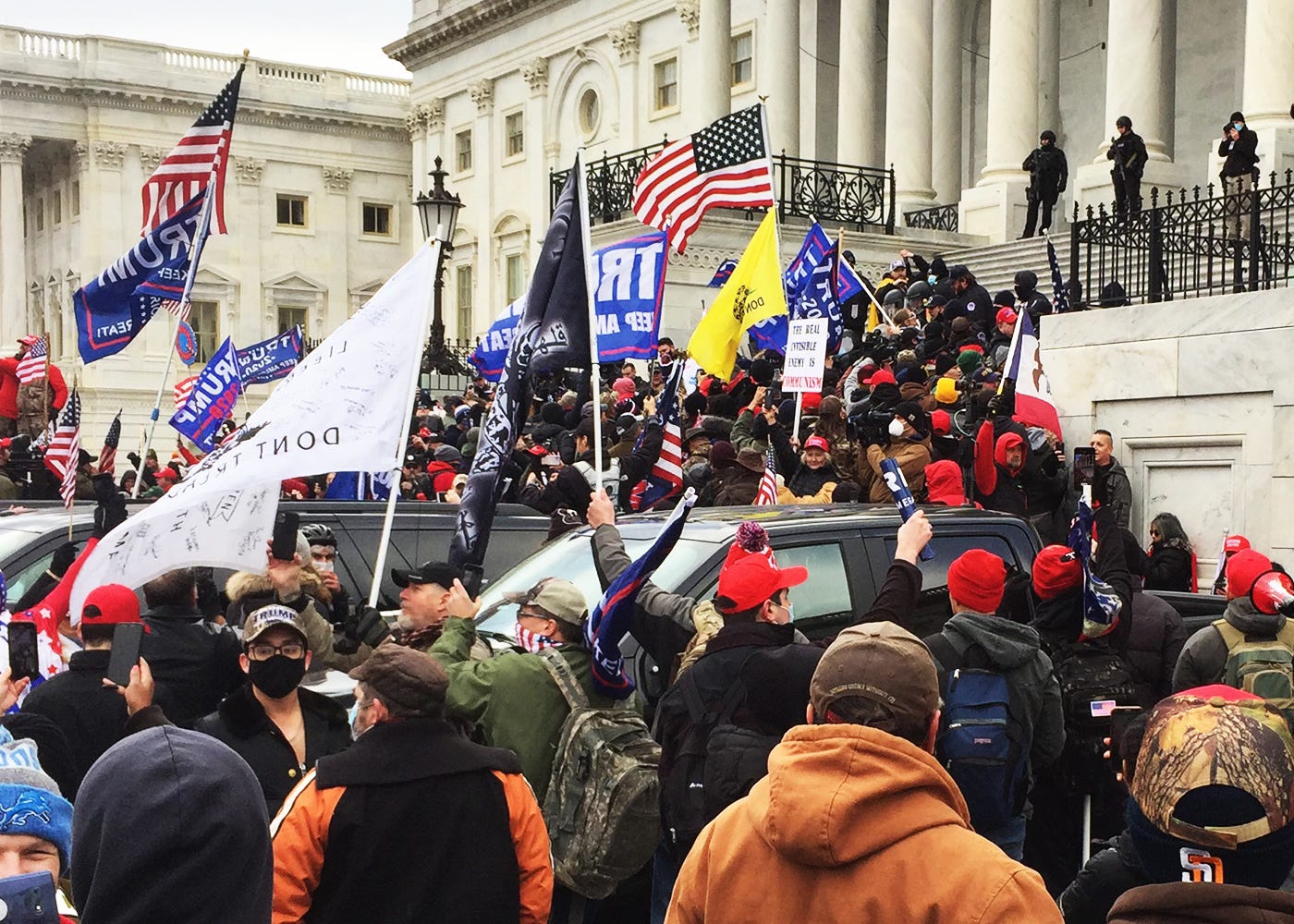Techno-Fascism Part#7: The Age of Fantasy
The concluding part of Techno-Fascism.
As everyone will recall, indeed has recalled, over and over again: on January the 6th 2021 a mob of armed conspiracists, most of whom had been radicalised online, launched a massed frontal assault on the US Capitol. It was a rupture in cyberspace, the intoxicating fantasies lived online and stimulated by engagement algorithms and social media beat their way into the real world with an attempt to overthrow the state.
For me, the most affecting impression from that day was not the unfolding legal-constitutional crisis, it was the shrieking terror of the few police officers who found themselves swept beneath the livid waves of mob violence. The kind of primal terror that invades the night and seizes your chest, the terror that swallows your breath at the thought of it. Concussive, helpless terror of the slow, carnal death that enveloped those officers. Even if they were eventually restored to life, it would not be life as it had been lived, the stain of terror is indelible.
Daniel Hodges, trapped against a door as hundreds of contorted faces press in, hands tearing at his neck and clothing, squeezing the breath from his failing body, his bones cracking under the pressure, his consciousness slowly dropping from him, towards oblivion. Michael Fanone, pulled beneath the surging crowd, struggling to swim towards the surface, convulsing as a hand pushes a taser against his skin, hands spray chemicals into his eyes, setting them aflame, hands beat his face and body, which stiffens in cardiac arrest, hands swarm over him while he lies prone, blinded and screaming desperately of his children, and among the hundreds of grasping, swinging, pummelling hands not one extends to help lift him from death.
On the 20th of January 2025, Donald Trump issued a blanket pardon to those responsible.
The most interesting aspect of Trump’s pardons was the spontaneous reaction of the radical Right and the Magasphere. Rather than simply express relief and wait for the process to take its course, supporters of the convicted marched on police stations and accosted cops, with self-righteous demands for their friends to be released without any procedural delay whatsoever. That this is, of course, not how the legal-penal system works, was the whole point – within the Magasphere Trump’s declaration was taken as supralegal, and confirmed that the January 6th convicts were martyrs; their convictions and detentions were cast as a perversion, rather than an operation, of the law. This distinguished Trump’s wholesale pardons from almost all previous Presidential pardons, in that the pardon was received not as a reprieve for the guilty, but as vindication of the innocent.
The indiscriminate manner in which the pardons were issued, taking no account of the severity of the offence, or the degree of violence committed by the various convicts, the accompanying language, the subversive disregard for the law and legal system, including for pending cases, not only granted a reprieve to January 6thconvicts, it served to confirm the fantasies of the entire Magasphere.
The cosmology of the Magasphere is a synthesis of fantasy and reality, facilitated by the era of lives lived online to such a degree that people have a hard time distinguishing where fantasy ends and reality begins; where the common substance is. Part of the specific fantasy of hardcore, conspiratorial Trump supporters is that their leader is an avenging-angel embarked on a righteous campaign to dismantle the repressive apparatus of the state, including its courts, by which they feel coerced and humiliated. For his supporters, Trump is above the law precisely because he is the law, an immaculate instrument of divine justice, while the contemporary legal system is merely a corrupt organ of the “deep state”.

A few weeks after the pardons, JD Vance insulted the European democracies with a speech at the Munich Security Conference in which he accused them of suppressing free speech and violating “basic liberties”. In doing so, he promulgated one of the favourite themes of the radical Right, which is that they are subjected to tyrannical censorship and thought-policing by the state, by “elites”, by media conformity, by academic orthodoxy, by excessive wokery. What they describe as “free speech” is a fundamental, totemic issue for the Right, but it is not really concerned with censorship, as they insist. “Free speech”, in the mouths of this version of the Right, expresses both an affirmation of their fantasy, and a neurotic fear of its disruption.
While Vance disgraced himself and his country in Munich, his administration banned the Associated Press from White House press briefings, arrested students for engaging in peaceful protest, issued threats to media organisations, undertook acceptability “audits” of the books available in schools, demanded, under threat of punishment, that universities conform with the ideological positions of the Presidency, and embarked on the mass surveillance and deportation of journalists, to the degree that the Committee to Protect Journalists had to issue an international warning about travel to the US. JD Vance, the Trump administration, and the Maga-Right are transparently unconcerned with defending free speech.
The rationale behind free speech is the proposition that our thoughts and words are not circumscribed in the way that our actions are, but the Maga-Right’s distorted concept of “free speech”, in a context where they are otherwise highly censorious, is something different; it exists to protect their fantasies. Any disruption of their ability to describe and live their fantasies online (by, say, efforts to counter disinformation, or fact-checking and community standards) reminds them of the distinction between their online existence and material realities offline, and confronts them with the distressing prospect that their fantasies may always remain unrealised. Donald Trump’s arrival announced the political age of fantasy; hence the fantastical post-pardon demands presented by Maga types to bewildered cops outside police stations.
Fascism has always been a political movement of fantasy and spectacle, which is part of the reason that it has historically struggled to resurrect itself within the modern democracies – contact with reality is fatal to its prospects. Fascists have therefore understood the need for their real intentions to remain clandestine, and have typically presented their political program as an unremarkable form of atavistic conservatism. It's also why the most spectacular acts committed by Far-Right radicals have focused on destabilising reality as a pre-condition of integrating Fascism: the Oklahoma bombing, and the massacres perpetrated by Anders Breivik and Brenton Tarrant, for example. But there has been no modern equivalent of a fantastic, costumed march on Munich with a genuine intention to overthrow the state, as in 1923, until, perhaps, January the 6th 2021. In their attack on the Capitol, the Far-Right saw no barrier between their fantasies and imminent reality, that is the parallel with the 1920s, and why it was the most dangerous moment in decades.

On the freezing afternoon of January 25th, 2025, the day of the pardons, Donald Trump was sworn in to his second term. His inauguration was attended by the leaders of several Far-Right and neo-Fascist parties from Europe – Vox, AfD, National Rally – as well as prominent conspiracy theorists, and the heads of some of the most powerful companies in Silicon Valley, who gathered in fealty while their businesses energetically torched content moderation policies, fact-checking protocols and editorial standards, in order to better conform to the ideological diktats of the incoming Trump presidency, and remove the mechanisms of fantasy-disruption.
The tech oligarchs had worked hard to get Trump elected; they had poured millions of dollars into financing his campaign. JD Vance, the protégé and Vice-Presidential pick of the tech billionaire Peter Thiel, placed his hand on a bible in the Capitol Rotunda, where four years earlier hordes of armed, Right-wing militia had demanded the head of Nancy Pelosi. As wintery winds swirled around the Capitol, the image of the tech barons, stiffly assembled in line to genuflect before Trump, recalled the summit meeting between Vladimir Putin and the leading “businessmen” of post-Soviet Russia at the turn of the century, a meeting held to affirm the union of security-state and oligarchy, in a new Eurasian autocracy.
In their complicity with the Trump administration and the Maga-Right, the tech oligarchs explicitly committed to the political age of fantasy and authoritarianism. Their motivations for doing so were likely varied, but certainly included, on the part of Thiel, Elon Musk and others, an accelerationist belief in disruption, the same type of destructive pathology that we see in their business practices. This strain of thought held that the political, economic and cultural status quo had become intolerable, and that post-war Liberalism had produced a decadent, declining empire in the West that required swift euthanasia, which the brute-force chaos of Trumpism had the best prospects of accomplishing.
The intellectual movement behind this emerged online, from the fantasies that germinate in the online subcultures, that are fed by the algorithms, that network with a greater speed and facility than in any previous epoch. It permeates all levels of the Trump administration, from the Vice Presidency down to the legions of White House staffers whom investigative journalists have linked to Twitter accounts which disseminate the most vile racism, misogyny and Fascism; the type of grotesque provocations that populated 4chan and similar communities, from where many of these people drew their politics. And it has a name: Neoreaction, or NRx.
The “Dark Enlightenment”.
The corpus of Neoreactionary writing is as verbose as it is boring, so I will strive to be concise. NRx originated as a response to the 2008 crash and the subsequent period of zombie Capitalism, and so part of its analysis overlaps with that of the Left (this was also true of classic-era, 1920s Fascism) but, as we explored earlier in this series, the active zone of ideology is not in diagnosis, but rather in prescription.
NRx alleges that the Neoliberal era of globalisation, international institutions and “universal values” has produced a moribund, bureaucratic, decadent and repressive state that entrenches mediocrity and decline. It refers to this as the “Cathedral”. In NRx’s conception, the “Cathedral” is not simply the government and state institutions, it is the whole edifice erected by and supportive of Liberal thought – the media, the academy, charity and third sector, NGOs and so on; what the Right often refers to as the “liberal consensus”. The movement is explicitly hostile to egalitarianism, as well as democracy in the form of universal suffrage.
NRx’s fantasy is for the “Cathedral” to be torn down and replaced with Libertarian-capitalist city-states administered by a limited executive operating under the benevolent dictatorship of a “monarch”. This is of course a tech fantasy, so NRx theorists’ idealised monarch is not of the belching, syphilitic, decapitating kind, but more like a Silicon Valley CEO – they identify Steve Jobs as the Platonic Ideal, a detail which attests to their belief in the ultimate munificence of the tech oligarchy, and that the private sector tech industry is the last best hope of mankind.
Insofar as democracy has a role, it is simply within the context of market mechanisms, a form of consumer choice - those dissatisfied with life in one city-state, for example, can move to an alternative one. In this respect, Neoreactionary ideas represent a fork of Neoliberalism, which is one of the many contradictions that marbles the theory; it’s progenitors are the Libertarianism of the Austrian school and the ideas of Milton Friedman which, carried to their end, arrive at Friedman’s dictum that “democracy is the enemy of freedom”, a concept that provided the theoretical foundation of Elon Musk’s recent attempts to destroy the US government, and which we explored in part four of this series. Socially, Neoreaction is conservative, authoritarian, racist and supremacist, it bears similarities to the Far-Right fantasies of thinkers like the Russian ideologue Aleksandr Dugin, which have contributed to Russia’s own fantasy era of revanchist nationalism.
So there we have it. Where the Left has failed to propagate a vision for a post zombie Capitalism future (or, to use Mark Fisher’s phrase, an alternative to Capitalist Realism), the Far-Right has done so: a techno-futurist fantasy that emerged from the same online milieu as cyber-utopianism.
Neoreaction’s principal theorists are the blogger Mencius Moldbug, a.k.a Curtis Yarvin, and the accelerationist philosopher Nick Land, who coined the phrase “The Dark Enlightenment” to describe the set of ideas. Of the two, Land is the more interesting and more extreme (his views appear to have emanated from a psychological breakdown), while Yarvin is the more famous.
The most notable figures within both the oligarchy and politics to have been influenced by Neoreactionary thought are Peter Thiel, Mark Andreessen and JD Vance, though the ideas proliferate in Silicon Valley and amongst Trump-world staffers. After Trump’s victory in the 2024 election, Yarvin suddenly found himself the object of titillated media interest, with profiles and interviews appearing in The New York Times, The New Yorker, The Guardian and Politico.
The best of these is the outstanding profile Curtis Yarvin’s Plot Against America by Ava Kofman, published in The New Yorker on June 2nd, 2025. In it, and in the person of Yarvin, we see the culmination of many of the themes that I’ve been drawing together throughout this series: the individualism and contrarianism of the countercultural 60s and the Bay Area hippies; the ideologies that informed the computer age; the Libertarian-Capitalism of Silicon Valley and the Cyber-utopians; into the Libertarian-authoritarianism of the present moment and, eventually, the prospect of a new Fascist ascendancy:
Friends from Yarvin’s twenties described him as a reflexive contrarian who revelled in provocation. “He wasn’t a sweet kid, and he could sometimes be nasty, but he wasn’t Moldbug,” one said. Politically and culturally, Yarvin was a liberal—“a big old hippie,”…He had a ponytail, wore a silver hoop earring, dropped acid at raves, and wrote poetry…He used some of [his money] to buy a condo near the Haight-Ashbury neighborhood of San Francisco and the rest to fund a self-directed study of computer science and political theory… Yarvin nearly ended up a libertarian. As a Bay Area coder and a devotee of Austrian-school economists in his late twenties, he exhibited all the risk factors. Then he discovered Hoppe’s book “Democracy: The God That Failed” (2001) and changed his mind. Yarvin soon adopted Hoppe’s imago of a benevolent strongman—someone who would govern efficiently, avoid senseless wars, and prioritize the well-being of his subjects.
The portrait that emerges from Kofman’s article, as well as any acquaintance with the online communities in which Neoreactionary ideas are discussed, is one of a charmless misfit, with a simultaneous desire to be attractive (which expresses itself as a narcissistic demand, rather than through charisma), to be admired, and to wreak vengeance. These are the politics of a fractured, leaking ego: supercilious, graceless and obnoxious. There’s a fragile dilettantism about Yarvin and his ilk, a repetitive insistence that all value can be measured in IQ (where they, of course, are priced most expensively), a smug geekiness which deploys a specialised lexicon to belittle those outside the in-crowd with acronyms like “NPC”, an adolescent and vainglorious recital of their own exceptionalism which, of course, screams hormonal insecurity. And an awful lot of tell don’t show. Nrx is shot through with the obsessive pedantry of the Otaku and the bitterness and cruelty of “Netto Uyoku” net rightism: pedantic, insecure and obsessed with boastful demonstrations of intellectual virility for its own sake.
In Kofman’s telling, Yarvin himself is frequently moved to tears, perhaps a counterpart to Donald Trump’s own hippiesque descriptions of almost everything as “beautiful”, and all wrapped in love:
Gesturing to the homeless population camped in the neighborhood, he suddenly began to cry. “The idea that this represents success, or this represents the ‘worst of all systems, except for all the others’ ”—he was referencing Churchill’s famous comment about democracy, which I’d paraphrased earlier—“is highly delusional,” he said, wiping away the tears. (A few weeks later, on a trip to London, I watched him break down while giving a similar speech to a member of the House of Lords. It was less affecting the second time around.)
I take Yarvin’s tearful love for the people as a misfit’s contempt for people; the imaginary, requited love that resides in vengeful fantasises, where people are reduced to avatars in a tormented universe of desire, bitterness and self-gratification. He’s an Otaku.
On one level NRx is just a masquerade, a deranged spectacle for the internet era; but therein lies the danger, because a deranged spectacle is precisely what Nazism was, and the great error of the Weimar Republic is that it took Nazism seriously for what it was, and laughed at it.
Techno-Fascism
As a set of ideas, NRx’s achievement has been to unite the authoritarianism of the traditional, reactionary Right which pushed Trump into office in 2016 (personified by the likes of Steve Bannon and Stephen Miller), with the individualistic Libertarianism of Silicon Valley. It is this syncretic Libertarian-authoritarianism that we saw at work on social media during the Covid pandemic, on January the 6th 2021, and in the pact between the tech oligarchs and MAGA that produced the Trump restoration in 2024.
In part four of this series we looked at the Libertarian fantasies that came to dominate the culture of Silicon Valley in the 1990s, at the moment of the tech industry’s ascent to global dominance, a culture that the technology writer Paulina Borsook described in Cyberselfish as “the true revenge of the nerds”. Borsook warned that it would come for political power, and that moment has arrived. The radical Right’s message of small-state autocracy chimed with the Randian narcissism of a modern, post techno-hippie, post cyber-utopian tech class eager to exercise its plutocratic power, indulge its Libertarian-hero fantasies and talk about transhumanism and colonising space.
Marx’s “authoritarianism of the individual” has been intoxicating Silicon Valley for some years now. In 2021, Jerry Davis, Fellow at the Center for Advanced Study in the Behavioral Sciences at Stanford, published an article in The Conversation entitled Ayn Rand-inspired ‘myth of the founder’ puts tremendous power in hands of Big Tech CEOs like Zuckerberg – posing real risks to democracy. The article suggests that tech oligarchs have been deploying the mechanisms of Capitalism to undermine oversight, accountability and corporate democracy, in direct defiance of the claims made by NRx (and Libertarian Capitalists generally) that those same mechanisms would prevent their “corporate city-states” from quickly devolving into Fascist tyrannies:
Dozens of…publicly traded tech companies – many with household names such as Google, Facebook, Doordash, Airbnb and Slack – have issued two types of shares in an effort to retain control for founders and insiders… dual-class shares essentially short-circuit almost all the other means that limit executive power. Companies with dual-class shares rarely made up more than 10% of public listings in a given year until the 2000s, when tech startups began using them more frequently… The dam began to break after Facebook went public in 2012 with a dual-class stock structure that kept founder Mark Zuckerberg firmly in control – he alone controls almost 60% of the company. In 2020, over 40% of tech companies that went public did so with two or more classes of shares with unequal voting rights.
I attribute it to Silicon Valley’s mythology of the founder –- what I would dub an “Ayn Rand theory of corporate governance” that credits founders with superhuman vision and competence that merit deference from lesser mortals…. Perhaps unsurprisingly, Rand has a strong following among tech founders, whose creative genius may be “threatened” by any form of outside regulation.
What happens when powerful, unconstrained founders control the most powerful companies in the world?... The tech sector is increasingly laying claim to central command posts of the U.S. economy. Americans’ access to news and information, financial services, social networks and even groceries is mediated by a handful of companies controlled by a handful of people.
Recall that in the wake of the Jan. 6 Capitol insurrection, the CEOs of Facebook and Twitter were able to eject former President Donald Trump from his favorite means of communication – virtually silencing him overnight. And Apple, Google and Amazon cut off Parler, the right-wing social media platform used by some of the insurrectionists to plan their actions. Not all of these companies have dual-class shares, but this illustrates just how much power tech companies have over America’s political discourse.
One does not have to disagree with their decision to see that a form of political power is becoming increasingly concentrated in the hands of companies with limited outside oversight.
What Davis’s final sentence invites us to contemplate is, although those on both the Left and Liberal centre might have approved of the censure of Donald Trump after January the 6th, what would happen if the tech companies deployed their political power in circumstances where we did not approve? Well, in 2024 they switched sides, didn’t they?
Davis’s description of “Silicon Valley’s mythology of the founder” is, of course, a description of a form of elitism, and yet another contradiction within NRx: it simultaneously venerates and disdains elites. This is where the theory departs from classic Libertarianism - liberty is NRx’s vehicle, not its end; it deploys Libertarianism only as a means of achieving the ascent of a new authoritarian elite.
Paulina Borsook suggested that in order for Silicon Valley to maintain its Randian fantasies, it requires a form of psychological evasion, the pretence that the tech sector was built by the pioneer spirit of exceptional individuals, rather than through the massive economic, political and regulatory support provided by the state. But I’m not so sure that the tech oligarchs do ignore this fact, which is precisely why some of them think that they should just be in charge of the state, as Yarvin proposes.
I do not like to throw the term “Fascism” around lightly, and I believe that the Left is guilty of doing so too often. But in describing the present miasma that is rolling into our politics and societies from Silicon Valley, I think the use of that term is justified.
Some proponents of Neoreaction, including Nick Land, explicitly reject the charge of Fascism, and like to run the argument that Fascism was anti-capitalist, whereas NRx is hyper-capitalist. While this may have been true of Fascism’s own pronouncements (which were often unstable and paradoxical), the relationship between twentieth century Fascism and capital was not, in practice, especially hostile; as with most of its concepts, Fascism’s position on capital was refracted through its racism - what it especially didn’t like were Jewish capitalists, or fantasy capitalists “controlled by Jews”, rather than capitalists per se. It’s also true to say that Fascism was hostile to religion, and yet faith is absolutely core to its ideology.
Rather than the specious claims that Fascism made about itself, what we see in the Libertarian-authoritarian aspirations of NRx and Trumpism are all the actual characteristics of Fascism: a corporate state with power concentrated in an executive under a charismatic leader; a highly stratified society, with a strict hierarchy based on arbitrary concepts of “merit” (in the case of the Nazis, this was racial, but a particular concept of mathematical-intellectual ability, or “entrepreneurialism”, are decent enough analogues); elitism, with an accompanying emphasis on class co-operation in place of class antagonism; a pact between capital, oligarchy and political leadership, in which the oligarchy agrees to subordinate itself in exchange for broad supra-legal privileges; “traditional” conservative values enforced by a central authority; racism; extreme nationalism; hostility towards independent media institutions; the militarisation of the state…I could go on with this list, but I think that the similarities are enough that we don’t have to argue about it. We’ve seen this before, dressing it up like a cyber-punk, or Steve Jobs, doesn’t change it.
In an interview on The Rest Is Politics: Leading podcast on the 14th of April 2025, the journalist Ezra Klein addressed the political character of “the explicit, often self-described effort among all of the MAGA people from JD Vance to Donald Trump, to their in-house philosophers…to change the regime, to destroy what they call the “Cathedral”. Klein talked of “the effect Trump has on the world…the way he has persuaded so many in his coalition to embrace the politics of public cruelty”. Klein gave examples from what he called a “4chan-like celebration of mimetic cruelty” - communications from the White House X account, run by NRx-inspired staffers, which labelled the sound of manacles dragging across the floor “immigrant ASMR”. When it became popular to use ChatGPT to create memes in the animation style of studio Ghibli, the White House created and posted one of a female immigrant weeping as she is deported by ICE officers. “When you crush that part of yourself that knows that that is wrong”, Klein said, “you’ve crushed a really important guardrail between yourself and a descent into a kind of inhumanity…the really dangerous thing about MAGA under Donald Trump is [that] it is a movement about the political virtues of cruelty and the need to signal that as a kind of important reclamation of strength and nationalism in politics”.
As we covered in part six of this series, the tech sector bears its share of the culpability for these tendencies, for the destabilisation of truth, for stimulating and amplifying the far-right, the lies on which they rely, and for the surge in political extremism. Its business practices, and the deregulated market capitalism championed by its dominant ideologies also set the conditions for this political moment. But these mechanisms evolved beyond the cynicism of YouTube’s early efforts to “increase watch time” as part of some ethics-free business plan, and the coercive potential of the internet is now deployed, along with massive sums of capital, as part of direct, ideological, political action, as we have seen most vividly with Elon Musk’s acquisition of Twitter.
When the most influential personalities on the tech-right - Peter Thiel, for example – and their adherents in politics and the intellectual class, complain about “elitism”, about stagnation, about a society in crisis, they are wrestling with the destructive nihilism of their own creation, and therein lies the path to the myth, fantasy, cruelty and ecstasy of Fascism.
We Owe It All To The Hippies
“When Charles Manson took LSD in the late ’60s and the murders started, what he saw on LSD, what he learned, was that you could be like an antihero in a Dostoyevsky book and everything was permitted”. This statement was uttered by Peter Thiel during an interview with Ross Douthat for The New York Times on the 26th of June, 2025. The interview was entitled Peter Thiel and the Antichrist – the original tech right player on A.I., Mars and immortality.
“In my telling of the history, everyone became as deranged as Charles Manson and the hippies took over”, Thiel goes on, “my telling of the history of the 1970s is the hippies did win. We landed on the moon in July of 1969, Woodstock started three weeks later and, with the benefit of hindsight, that’s when progress stopped and the hippies won”.
This series began as a kind of sequel to Lessons from the Counterculture, my series on the 1960s and the hippie movement. In part one I wrote:
It's worth noting that the Left’s victories in the 1960s were the Right’s defeats. The ‘60s is the locus of the Right’s historical grievance, the painful moment at which those on the Right feel that their future was stolen from them, an imagined future of a weird, perpetual past, a permanent 1950s of patriarchal order, status, conformism, immutable gender roles, racial hierarchy, sexual diffidence, religious observance and chauvinistic nationalism. These are their indices of virtue, the ideal Western Polis, in their minds violently supplanted by modernity and a perplexing hellscape in which all that is scared is violated and all that is abject is venerated. Their culture war is a struggle for redress, through which they seek to recover this lost future and their sense of identity.
This passage sought to describe the MAGA mind, the attitude of the Steve Bannon faction and Trumpism’s reactionary anger; what it did not capture, is the bizarre heterodoxy of Theil and NRx.
In my interpretation of the ‘60s, although the Left had important achievements, which continue to shape modern society to our collective benefit, the Counterculture ultimately resolved in a victory for the Right. This was, I argued, because the core ideologies guiding most of the Counterculture, in particular the hippie movement, were Right-wing. The individualism, Libertarianism and politics of self-interest that characterised the hippies led directly to the deregulated, “greed is good” market Capitalism of the 1980s and the Neoliberal era. In this series, I have gone on to explore how the hippies carried these tendencies into Silicon Valley, and how they influenced the development of computers and the computer age.
For Thiel, the victory of the hippies has created a Left-wing society of permissiveness, conformity, political correctness and stagnation enforced through regulation, censorship and the coercive mechanisms of the both the state and global institutions.
But Thiel’s views are riven with paradoxes: his Manson is the profane consequence of a cultural movement in which “everything is permitted”, yet he advocates for a permissive, Libertarian rejection of regulation, which he calls “totalitarian”. In an article for the Financial Times, published in January 2025, entitled A time for truth and reconciliation, he described the election of Donald Trump as “the most peaceful means of resolving the old guard’s war on the internet, a war the internet won”, yet he is happy to endorse the wars of the authoritarian Right, and has recapitulated Milton Friedman’s criticism of democracy in his own, elitist, renunciation of universal suffrage. As we have seen, Neoreaction, a movement suffused with the conspiracism and fantasy of the cyber age, permits all these paradoxes to co-exist.
In A time for truth and reconciliation, Theil takes a walk to the soundtrack of conspiracy theory’s greatest hits:
My friend and colleague Eric Weinstein calls the pre-internet custodians of secrets the Distributed Idea Suppression Complex (DISC) — the media organisations, bureaucracies, universities and government-funded NGOs that traditionally delimited public conversation. In hindsight, the internet had already begun our liberation from the DISC prison upon the prison death of financier and child sex offender Jeffrey Epstein in 2019. Almost half of Americans polled that year mistrusted the official story that he died by suicide, suggesting that DISC had lost total control of the narrative.
It may be too early to answer the internet’s questions about the late Mr Epstein. But one cannot say the same of the assassination of John F Kennedy. Sixty-five per cent of Americans still doubt that Lee Harvey Oswald acted alone. Like an outlandishly postmodern detective story, we have waited 61 years for a denouement…We cannot wait six decades, however, to end the lockdown on a free discussion about Covid-19.
Our First Amendment frames the rules of engagement for domestic fights over free speech, but the global reach of the internet tempts its adversaries into a global war. Can we believe that a Brazilian judge banned X without American backing, in a tragicomic perversion of the Monroe Doctrine? Were we complicit in Australia’s recent legislation requiring age verification for social media users, the beginning of the end of internet anonymity? Did we muster up even two minutes’ criticism of the UK, which has arrested hundreds of people a year for online speech triggering, among other things, “annoyance, inconvenience or needless anxiety”? We may expect no better from Orwellian dictatorships in East Asia and Eurasia, but we must support a free internet in Oceania.
Here we glimpse the thinking at work on January the 6th and its ultraviolent spectacle of folklore and fantasy: the slain king, John F Kennedy; the evil Jewish banker, Jeffrey Epstein; the Satanic plague, Covid-19, and the sinister mage, Anthony Fauci, who released it from mysterious caves in China, while trying to unlock the forbidden secrets of God.
Theil’s article argues the need to convene a “truth and reconciliation committee”, a portal through which we can enter this realm of undisrupted fantasy. He gives examples, in his march through the conspiracies, of the modernist fantasy that we would all be free to live in, if only permitted to do so by the deep state. Presumably, if Curtis Yarvin’s Fascist “monarchy” could be realised, we could all live inside the fantasy and for those, like Thiel, who can afford it, the fantasy could be limitless.
“When Charles Manson took LSD in the late ’60s and the murders started”, Thiel said in his interview, “what he saw on LSD, what he learned, was that you could be like an antihero in a Dostoyevsky book and everything was permitted”.
“The freaks who design computer science will wrest power away from the rich and powerful institutions”, Stewart Brand said, “computers are coming to the people. This is good news, the best since psychedelics”.
And in answer to Thiel, Yarvin and Land’s own hallucinations, as counterpart to Milton Friedman’s dictum that “democracy destroys freedom” we have Slavoj Žižek’s observation that “brought to the end this attitude is self-destructive, because too much individual freedom…destroys human freedom itself”.
In the real world…
…The second Trump term has brought a wave of arbitrary arrests and detentions. There are daily immigration raids throughout America, performed with para-military aesthetics. There are deportations to a penal colony in El Salvador, a concentration camp in Florida, Marines deployed to a US city, journalists intimidated by border agents, judges arrested in their own courthouses, judicial rulings ignored by the executive, tax cuts for the wealthy and welfare cuts for the poor. And so on, the list spools out relentlessly.
The European democracies are under threat from insurgent Far-right, Trumpist movements. This phenomenon isn’t going anywhere, articles and studies on conspiracism and the Far-right repeatedly warn that increasing levels of time spent online is making the problem worse, and that the progression of AI is going to intensify it, no doubt to the delight of accelerationists like Nick Land. The ideal conditions in which the Far-right thrives are here, which the pact between the tech oligarchy and MAGA enthusiastically exploits with massive amounts of capital and the algorithmic potential of the internet.
The form of twenty-first century Fascism is unlikely to be as spectacular and lurid as it was in the 1920s and 30s; Russia, Hungary and other examples have sketched the contours, it’s what Zach Beauchamp, author of The Reactionary Spirit, calls “competitive autocracy”: there is the appearance of democracy and a constitution, the appearance of elections, the appearance of an independent media; but the elections are heavily weighted in favour of the autocrat, it’s impossible for a challenger to actually win; the media’s ability to report is heavily circumscribed; the institutions are Potemkin institutions; the constitutional arrangements of the state and its democratic processes are gradually subverted. It’s too early to know whether this type of Fascism will succeed in the US and Europe, but if it does, it will happen slowly, and with fear. Everywhere, there will be fear.










First class article and series...well researched and with incisive comments to elucidate a most dangerous comtemporary political scene. This needs further reflection and denouncement of the fascists who want to control the world...